- Home
- Michael Griffo
Moonglow Page 15
Moonglow Read online
Page 15
I whip my head around, but no one’s there. I remain quiet for a few seconds, straining my ears to discover an intruder, but none appears. The crackling and the hissing and the squeaking are all gone. Guess that’s what happens when you lose yourself in a daydream: You begin to hear things.
Turning back to my mother, I stroke her hand and am overcome by the desire to hear her once more. I want to hear her singsong voice answer my questions. Who cares what she says; who cares if she doesn’t have the answers. Her voice will be enough.
“What’s happening to me, Mom?”
Silence.
“Why am I different?”
More silence.
“Why am I changing?”
Suddenly, my mother’s face starts to glow. It’s like there’s a light shining from within her body, illuminating her face to let me know that she can hear me. I’m not fooled. I know that I’m going insane; I know that this is impossible, but I find it so comforting that I ask more questions.
“Why can’t I put an end to this, Mom?”
The light emanating from my mother grows softer, more like stardust floating around an angel’s wings. It’s impossible, but she’s responding to my voice. Maybe it’s because she can sense that I’m desperate to make some kind of connection, I don’t know, but instead of analyzing it, I continue to talk.
“I don’t like what’s happening to me, but I can’t do anything to stop it,” I admit. “I don’t understand any of it, but my body and my mind are not the same, and they haven’t been for months!”
The stardust lifts, and the light around her face is twinkling. I look away and focus on the small wooden desk in the corner of the room, focusing hard on it, and then turn back to my mother. She’s still glowing. It’s real; it isn’t my imagination. I have absolutely no idea what’s happening, but I don’t care. I don’t want an explanation; I just want an answer, and I’m convinced she can give me one.
I lean in close to her, an inch from her face. I’m wrapped in the glimmer of light and hope and love that is pouring out of her. “Mom,” I whisper. “Why did I kill Jess?”
For the second time in very recent memory, I see my mother’s eyes. But this time they’re different; they’re alive. They open, and they’re like two gray rainclouds with the promise of a clear blue sky behind them. They’re beautiful, and they’re looking at me with a kind of love I barely remember. Instinctively, I squeeze my mother’s hand tighter, and I feel more than warmth; I feel movement. The light was only the beginning; my mother’s starting to come alive. My temples are pounding with such excitement and surprise that I almost don’t hear her speak.
“Ask your father.”
The sound of her voice stuns me so sharply that I fall back in my chair and let go of her hand. Once our physical connection is lost so is she. Her eyelids close, and her face is shrouded in shadow once again. No!!
“Mom! Mommy, come back to me!” I shout, grabbing her hand.
There’s no response, only the emptiness I’m so used to. I’m left looking at a sleeping woman who looks like my mother. Where did she go?! Why did she speak to me and then leave?! And what did she mean?
Ask your father.
Maybe if I can revive her, she’ll explain what she meant. Frantically, I press the button at the side of her bed and shout into the intercom for a nurse to come. I’m still holding the device when I hear squeaking behind me again and turn around. This time I see the source of the sound.
“Nadine?!”
Somewhere in the distance I swear I can hear the buzzing of a swarm of bees.
“Is everything all right in here?” she asks.
“What are you doing here?” I ask.
“I heard you scream and came right in,” she explains.
It’s a logical explanation, but my body isn’t listening to my brain, so disbelief registers on my face. As a result Nadine explains further.
“I have work-study here twice a week,” she continues. Another logical explanation, but still there’s something about her calmness, something about how she’s standing in front of me like a statue, her face frozen instead of curious, that convinces me she’s lying. But why would she lie to me? And why would she be spying on me? Before our conversation can continue any further, a nurse I recognize bursts into the room, followed by a doctor whom I’ve never seen before.
“My mother woke up,” I say.
The nurse looks at me like I’m crazy, while the doctor ignores me and walks to the other side of the bed. He opens one of my mother’s eyelids with his thumb and shines a light into her pupil and then repeats the task in her other eye. Roughly, he presses his finger onto the mini-flashlight’s clicker and the little beam of light disappears.
“She spoke to me,” I add.
Now it’s clear that the doctor agrees with the nurse, because he’s looking at me like I should fill out a new patient form. Nadine, however, appears to accept every word I’ve said as fact. At least someone else in the room believes me.
“Miss Robineau?”
The doctor is very tall, way over six feet, so when he talks to me he looks down even from the other side of the bed. It makes what he has to say sound even more condescending. “I’m sorry, but there’s no change; your mother’s vital signs are the same,” he informs me. “She’s still in a coma.”
“You’re not looking hard enough!” I cry. “She opened her eyes. She looked right at me and spoke.”
“And what did she say?”
Now all three of them look exactly the same. They’re all staring at me, anxiously waiting to see how I’ll respond to the doctor’s question.
“She, um, she called out my name,” I lie.
This time the doctor doesn’t even try to make his tone sound anything but patronizing. “I’m sure that’s exactly what you’ve wanted to hear her say for years.”
The doctor makes a hasty exit. He’s followed by the nurse, who doesn’t even bother to say anything; she just offers me a pity-smile and bows her head on her way out, leaving Nadine alone with me and my mother in the room.
“I’m sorry,” Nadine says. Her voice is filled with so much compassion, I realize I must have misjudged her. That is until she turns to leave the room, and the sound of her shoes squeaking makes my breathing stop. I wonder how much she heard of what I said.
But I can’t worry about her right now. I have to get out of here and do exactly what my mother told me to do.
“Dad, we have to talk.”
That’s the first thing I say to my father when he comes into my room. I knew if I skipped dinner and stayed in my bedroom he would eventually come in to see how I was handling the latest news about Jess. When I share with him my latest news, he doesn’t seem the least bit surprised. I can’t take his nonchalant attitude any longer.
“What is wrong with you?!” I blurt out. “You’re not freaked out that Mom woke up and told me to ask you why I killed Jess?!”
“No, honey, I’m not.”
“And why the hell aren’t you?!”
I watch my father’s Adam’s apple rise and fall as he swallows. “Because I’ve known you would do something like this from before you were born.”
I remember the conversation my father had with Louis, the one I overheard, when he assumed it would only be a matter of time before I did something wrong. And now this comment.
“How?” My voice is cautious, and it takes a moment to find its strength. “How could you know that I would kill my best friend?!”
My father doesn’t move; he just stands at the foot of my bed, his arms dangling at his sides like they’re too heavy to lift. “I didn’t know who you would kill, but I always knew that you would kill someone.” His voice is not quite boastful, but he does sound as if he’s saying he always knew I’d get into a prestigious college or that I’d marry a doctor and not that he knew I’d commit murder. “And I’ve always known you would do it on your sixteenth birthday.”
My body slumps on my bed, and I grab onto my flower
pillow, clutching its softness with my fists. This is all too much. My father is a freak, a lunatic. He’s one of those crazy people you hear about on the news. He’s hidden it all these years, but finally it’s come out.
“Daddy, please,” I say, tears falling from my eyes. “You’re scaring me.”
“I’m sorry,” he says, and he almost sounds normal. “I wish I didn’t know about any of this. I wish it weren’t coming true, but it is.” He sits on my bed, and I pull my legs away, tuck them under myself so I’m practically sitting on my knees. We’re both aware that I want to keep a wide space between us so he doesn’t move any closer. “It’s all happening like I knew it would.”
“What?!” I scream. “What’s happening?!”
My father’s lips move, but it’s like I’m deaf, so I have to ask him again.
“What? Daddy, what’s coming true?!”
This time I hear him loud and clear.
“The curse.”
Chapter 11
“The what?!”
I could not have heard what I thought I heard. My father did not just tell me that the reason I’ve been acting strangely lately, the reason that I don’t feel like myself, the reason that Jess is dead is because of some curse. We live in Nebraska! This isn’t the jungle; chickens aren’t beheaded and sacrificed on Saturday nights in the town square for God’s sake!
“Dad, what are you talking about?”
“I know it’s hard to understand,” my father replies, sounding like one of my teachers.
“There’s nothing to understand,” I shout, sounding like a very ticked-off student. “Curses aren’t real.”
He shifts his body and bridges the gap that separates us by a few inches. I stop myself from leaning backwards. I’m not sure how close I want to be to my father right at this moment, but he is my father after all; he isn’t really some crazy person. Is he?
“I used to think that as well,” he says, his eyes completely consumed with sorrow. “I used to believe that curses were just made up, parts of legends.” He can’t or won’t look at me; he’s looking at something, I’m not sure what it is, but I know it’s not in my room. He’s looking at something from his past, a memory; whether it’s real or fake, I have no idea. “But now I know I was wrong.”
My father places his hand on my bed next to my knee. He wants me to reach out to him, to clasp his hand to make a connection, but I can’t. This conversation has stopped being ridiculous and is starting to become frightening. I don’t want it to become sentimental as well. Have to keep my heart out of this and only listen with my mind.
“I should’ve prepared you; I should’ve warned you,” he says, the words tumbling out of his mouth angrily. “But I did nothing . . . and now the curse has come true.”
“Dad, listen to me, curses don’t exist,” I start. “They turn princes into frogs and apples into lethal weapons in fairy tales. But they have nothing to do with real life.”
Ironically, my father’s smile is even more patronizing than that a-hole doctor’s in my mother’s hospital room. He’s the one claiming that curses are real, and I’m the whackjob.
“I know that you’re looking for an explanation for what happened, for what’s going on,” I say, keeping my voice as even and rational as possible. “But the only way we’re going to do that is to logically figure out what’s wrong with me.”
My father’s not paying attention to me. He’s looking down at the ground again, shaking his head. I have got to get him to listen.
“That’s the only way we’re going to be able to put an end to it,” I plead. “So nothing like this ever happens again.”
Still no response. Just his head shaking slowly from side to side and then suddenly stopping. “No,” he says finally.
His response so infuriates me that something inside of me is triggered, and I hear screams in my head that have no voice. For a split second I’m back at the hills, back with Jess when she was still alive. I’m not imagining this; it’s a real memory. I see a paw covered in red fur slice through the air, slice through Jess’s arm, ripping away her flesh. There was an animal; there was something with us out there. Blood gushes, Jess screams, a flood erupts in my mouth, and that taste is back. Bitter and familiar and delicious. I’m back in my room now, and I look at my father. He has to help me. Together we have to figure this out.
“The only way we’re going to put an end to this is to break the curse,” my father declares.
This is how my father plans on saving me? By executing a plan to break some nonexistent curse?!
My feet pound into the floor when I jump off the bed. They keep pounding as they take me from one end of the room to the other. Once again the walls, three white, one blazing orange, are like a cage. I wish the painted wall could erupt into flames, devour the entire house and me and my father with it, let Barnaby escape. He can be a jerk, but there’s no reason he should die for my crimes and my father’s stupidity.
“You’re drawn to it, aren’t you?”
My father’s question startles me out of my wish-trance, reminds me that walls can’t spontaneously combust, but once again I have no idea what he’s talking about. And my confusion reads all over my face.
“The wolf,” he says.
I look up at the banner on my wall and see the timberwolf, the Two W mascot, staring back at me, his paw reaching out, ferocious and tender, in a desperate attempt to make some kind of connection. He reminds me of my father.
“Seriously, Dad, you are freaking me out.”
My father looks weary, as if he’s used up every trick in his arsenal and still can’t make his obstinate child behave. Suddenly, he lowers himself to the floor and leans back against the footboard of my bed. Clasped hands resting in his lap, crossed legs, a sweet smile. He’s the perfect daddy. Except this daddy’s got a terrible secret.
“I need to tell you a story.”
“I was your age, just sixteen, when it started,” my father begins.
I want him to stop. I don’t know where his story is going to lead, but it can’t possibly have a happy ending.
“I thought I was a man, wanted to be one anyway. I was tired of being a boy, always having to do what I was told, always having to be instructed and not make my own choices, always having to wait for something exciting to happen.” He looks down at his hands resting in his lap, so I look at them too. We’re both expecting them to do something magical, but nothing comes. Just ten fingers interwoven and motionless. “I had no idea that my life was about to change forever.”
This time when he looks down at his hands, his thumbs spin around each other. Slowly, they turn a few times and then reverse direction. He seems fascinated by this action, as if he’s not controlling it, as if his thumbs have little thumb-minds of their own. Only when they stop moving does my father start to talk again.
“My dad and I used to go hunting,” he says, picking up the story. “Just the two of us, deep in the hills on the outskirts of town, sometimes for the weekend in the Sand Hills or near Lake McConaughy. We hunted deer mostly, on occasion pheasant or wild turkey. Once, my dad shot a moose, I have no idea what it was doing around here, must’ve gotten lost and strayed too far south, but my dad killed it.” Lost in his memory, my father laughs. “Whole town ate moose steaks for a month.”
Normally, the thought of eating a moose would disgust me. Now for some reason it doesn’t.
“My father promised that we would go on a special hunting trip for my birthday, my sixteenth, all the way up in Montana,” he remembers. “Bucks up there weigh almost seven hundred pounds, antlers five feet wide, majestic creatures, and I couldn’t wait to hunt them down with my new rifle. Show them that they were no match for me.”
The little boy still living inside my father comes out, and he sounds boastful and bold and unashamed at the prospect of teaching some innocent animal that he’s the stronger species. Not because he’s naturally superior, but because he’s smart enough to hunt with a rifle.
“Frid
ay after school I ran home after spending the entire day telling my friends that I wouldn’t be around for the weekend because my father was taking me on a trip, just the two of us,” he says. “I knew something was wrong when I turned the corner of my block. My dad’s pickup was parked in the driveway, right outside.”
My father grew up in this house, so I feel like I’m with him, standing right next to him in his memory. I get a mental picture of a dust-covered pickup truck where my father’s police car is usually parked, probably a red truck, tires covered in mud, and I know exactly what my father is thinking as a kid standing in front of his house. Something has to be wrong because fathers are never home right after school.
“He came home sick from the factory with stomach pains,” my father explains. “Turned out to be a gall bladder attack, but I didn’t care what it was, didn’t care if it was the flu or some fatal disease. All I knew was that my dad screwed up everything and my birthday hunting trip was canceled.”
When my father laughs this time, I smile along with him. I don’t find what he’s saying to be funny; it’s a reflex.
“But it was my birthday, and I wanted to celebrate by killing some deer,” my father remembers. “So the next morning that’s what I set out to do.”
“Without your father’s permission?” I ask.
“Without anyone knowing I had left,” he replies. “I took my dad’s treasured Winchester though, instead of my brand new Remington, so it would feel like he was coming with me.”

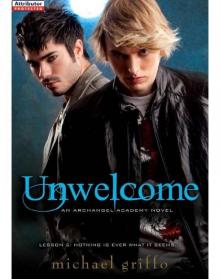 Unwelcome aa-2
Unwelcome aa-2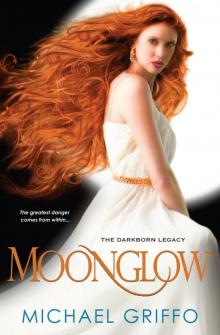 Moonglow
Moonglow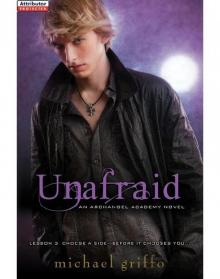 Unafraid aa-3
Unafraid aa-3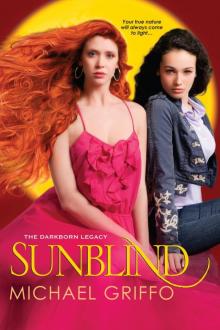 Sunblind
Sunblind Starfall
Starfall Unnatural
Unnatural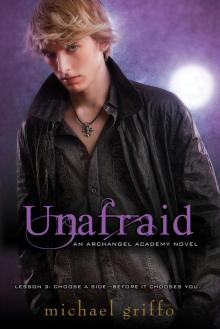 Unafraid
Unafraid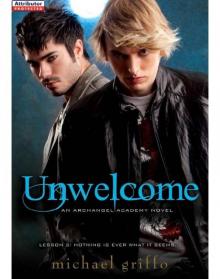 Unwelcome
Unwelcome Unnatural aa-1
Unnatural aa-1